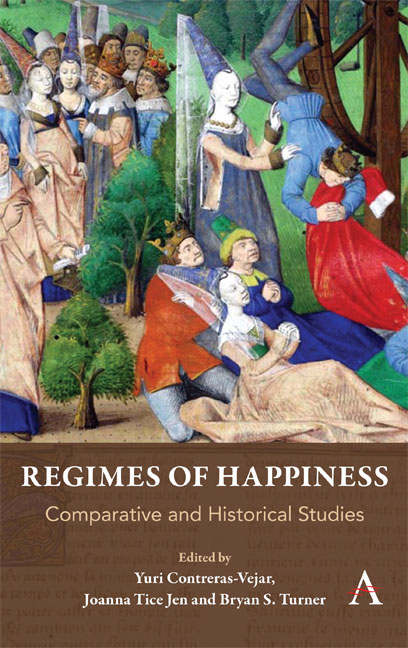Book contents
- Frontmatter
- Contents
- Acknowledgements
- Notes on Contributors
- Introduction: Reflections on Regimes of Happiness
- Part I Happiness in the West
- Chapter One A Fragment of Bliss: Augustinian Beatitudo and the Ideal of Atonement
- Chapter Two Arts of Happiness and Love: Translating Aristotle in the Later Middle Ages
- Chapter Three Spiritual Transcendence as the Path to Happiness in a Selection of Old French Texts
- Chapter Four On Machiavelli, St. Francis and the Pursuit of Happiness
- Chapter Five Their Idea of Happiness Prevents Easy Categorization of Scottish Enlightenment Philosophers
- Chapter Six A Path to Eternal Happiness: Convent Life in the United States in the Nineteenth Century
- Chapter Seven “Be Joyful Always!”: Twenty-First-Century Evangelical Conceptions of Happiness and Trumpist Politics
- Chapter Eight The Erasmus Program: The Promise of European Happiness
- Chapter Nine Innovations in the Psychological Study of Happiness: From Mirror Neurons to Mobile Technology
- Part II Comparative Perspectives
- Index
Chapter Five - Their Idea of Happiness Prevents Easy Categorization of Scottish Enlightenment Philosophers
from Part I - Happiness in the West
Published online by Cambridge University Press: 29 May 2019
- Frontmatter
- Contents
- Acknowledgements
- Notes on Contributors
- Introduction: Reflections on Regimes of Happiness
- Part I Happiness in the West
- Chapter One A Fragment of Bliss: Augustinian Beatitudo and the Ideal of Atonement
- Chapter Two Arts of Happiness and Love: Translating Aristotle in the Later Middle Ages
- Chapter Three Spiritual Transcendence as the Path to Happiness in a Selection of Old French Texts
- Chapter Four On Machiavelli, St. Francis and the Pursuit of Happiness
- Chapter Five Their Idea of Happiness Prevents Easy Categorization of Scottish Enlightenment Philosophers
- Chapter Six A Path to Eternal Happiness: Convent Life in the United States in the Nineteenth Century
- Chapter Seven “Be Joyful Always!”: Twenty-First-Century Evangelical Conceptions of Happiness and Trumpist Politics
- Chapter Eight The Erasmus Program: The Promise of European Happiness
- Chapter Nine Innovations in the Psychological Study of Happiness: From Mirror Neurons to Mobile Technology
- Part II Comparative Perspectives
- Index
Summary
What happiness entailed was a central concern in the Scottish Enlightenment. During the Enlightenment, people debated the meaning and cause of happiness. The deliberation continues to the present day. The controversy centers on the distinction between liberal notions of individual self- interest versus republican ideas of responsibility to the collective. The influence of happiness as a philosophical construct is profound. As a principle, the pursuit of happiness forms the bedrock of America's cultural development and identity. The right is enshrined in the tenets of our founding document, the Declaration of Independence; yet, defining what is meant by “the pursuit of happiness,” as influenced by eighteenth- century Scottish thought, continues to be contentious. This chapter examines how three philosophers of the Scottish Enlightenment balanced selfinterested materialism with morality in response to the portrait of happiness presented to them by theorists claimed by liberalism. This analysis complicates a one- dimensional view of happiness and the designation of these Scottish authors as supporting one particular ideology. The aim is to show that a more careful explanation is required both of what happiness entails and the doctrines espoused by these Scottish philosophers.
In this study, happiness is first introduced by a review of three authors who emphasized individual rights and personal pursuits, basic concepts of liberalism: Thomas Hobbes (1588–1679), John Locke (1632–1704) and Bernard de Mandeville (1670–1733). An account of works by three philosophers of the Scottish Enlightenment then follows: Francis Hutchinson (1694–1747), Henry Home, Lord Kames (1696–1782) and Adam Ferguson (1723–1816). Scottish writers disagreed with egoist views of happiness, believing that achieving happiness included more than self- interest. They also rejected the idea that human nature lacked inherent morality. With citation to these Scottish works, the aim is to show how their views of happiness were multifaceted and not limited to prioritizing the community over the individual or vice versa. By looking at how these Scottish philosophers incorporated both sides of happiness, it will be shown that the binary interpretation of the emotion— either self- indulgent gratification or nullification of the individual— is untenable. This review of their thoughts on happiness reveals that limiting these Scottish philosophers either to liberal/ individual or republican/communitarian tenets is inappropriate.
- Type
- Chapter
- Information
- Regimes of HappinessComparative and Historical Studies, pp. 63 - 78Publisher: Anthem PressPrint publication year: 2019

